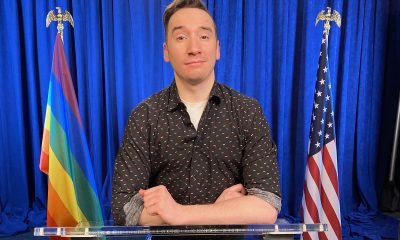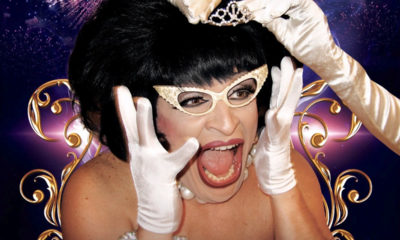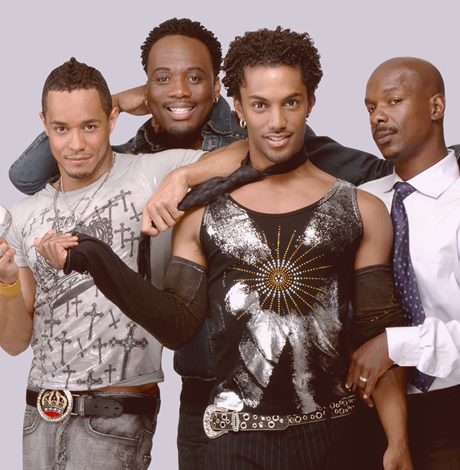Arts & Entertainment
Drama queens
Logo’s ‘A-List’ returns Monday; cast dishes on Reichen’s full-frontal pics, ‘evil’ Austin; Crews follow cast six days per week

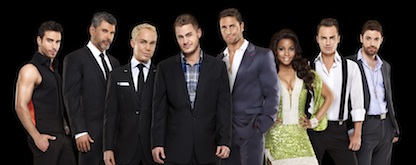
The cast of Logo’s ‘A List: New York’s’ second season, which returns Monday night. From left are Rodiney Santiago, Mike Ruiz, Ryan Nickulas, Austin Armacost, Reichen Lehmkuhl, Nyasha Zimucha, Derek Saathoff and TJ Kelly. (Photo courtesy of Logo)
It’s the show gays love — and love to hate. But many, of course, end up watching anyway.
TV’s gayest, guiltiest pleasure — even its creators embrace the “guilty pleasure” label — is back. “A List: New York’s” second season debuts Monday at 10 p.m. on Logo. The entire season one cast returns for 11 new episodes, this time with a gal pal in tow. The Blade spoke with the cast and crew to get the lowdown on the new season, find out what it’s like shooting the controversial series and ponder the show’s appeal.
The reality show, from the same people (True Entertainment) who brought “Real Housewives of Atlanta” to the air, debuted last October and follows the lives of five gay (and one bi; six total) men in New York who claim they’re at the top of the Manhattan social totem pole through their lives, loves and career ventures. Reality show vet Reichen Lehmkuhl (he won the fourth season of “Amazing Race” and formerly dated Lance Bass) unofficially heads the cast. A central theme of the first season was his tempestuous relationship with Brazilian model Rodiney Santiago, with troublemaker Austin Armacost never missing an opportunity to keep their social pot stirred.
It was a hit and helped, along with “RuPaul’s Drag Race,” put Logo, which debuted in 2005, on the pop culture map. The channel, owned by Viacom’s MTV Networks, won’t release ratings for the show but says it’s the second-highest rated show in the gay channel’s history (after “Drag Race”). A Dallas-based spin-off is planned for a fall debut.
The show’s reception has been wildly mixed. Some reviewers and fans say it’s great to see a gay-centric reality show instead of a mainstream show with token gay characters. Others have been appalled at what they say is a superficial and stereotype-laden cringe fest. Still others agree with that assessment but admit it’s well constructed and addictive.
Executive producer Dominic Pupa, who’s gay, says the show is “absolutely” a guilty pleasure and says the critical drubbing doesn’t mean it’s not successful at what its creators are aiming for.
“People roll their eyes all the time, but it captures people’s attention because it’s three things — people with means and access who live in New York. That trifecta of factors means it’s fascinating to watch. There’s something fun about people who are of means and do have access and discovering their lives can be just as exciting, dramatic and disappointing as yours. Plus it’s an ensemble show and people love ensembles because they can pick their favorite and tune in to see how they’re faring. Even the ones people hate — I hate to say character because it’s reality, but in the sense of being a dramatic narrative, they do sort of become characters — you still love to watch the ones you hate.”
Reichen, during a gym break (it’s legs-and-shoulders day; he goes seven days a week), says he learned early on to let go of the naysayers. It was also hard, he says, watching the first season and seeing how much was left out that would have added context to some of the less-flattering scenes.
“I used to read the blogs but then half way through, I stopped. I got rid of my Google alert and I have become a much happier person,” he says. “I kind of live in my own world. There were so many comments about my relationship with Rodiney, they said I didn’t care about him, I just brought him here and dropped him, but the truth is I made sure he had everything he needed and every opportunity he wanted and you know got him on his feet so he could pursue the stuff he wanted to do. It was such a slap in the face to watch this kind of play out in a very one-sided way … Rodiney knew it too. He was like, ‘Oh my god, he tried his best and Reichen’s not like that with me at all.’”
Letting go of the negative energy has centered Reichen in other ways, he says. It helped him shrug off the full frontal nude photos that surfaced recently of him. He admitted the photos — shot from the neck down — are of him.
“If that had happened five years ago, I think I would have shut myself into a mental institution,” he says. “But now my skin is so thick, I knew as soon as they surfaced, there would be every possible reaction. People would make fun of me, they would hate me, some people would like them — you just get to a point where you can deal with it whether it’s good or bad. It totally sucks that they surfaced without my permission — it was supposed to be a private thing, not something I broadcast for the whole world … but I wasn’t gonna pull an Anthony Wiener and lie about it. I was like, ‘Yeah, it’s me, go ahead and start shooting your arrows and let’s get it over with.’ I did mention that a lot of gay men do this kind of thing. I don’t feel I did anything immoral or illegal. It just so happens that because it was me, people cared.”
Rodiney agrees the show complicated their dating life and admits he was naïve about what he was getting into when he signed on.
“Last year was not easy for me,” he says. “It was very intense. It’s like I do the show and I forget I have the cameras with me but it’s who I am and they’re shooting me. There were a lot of difficult people who liked to create drama in my life. I’m the kind of person who just wants to live my life and not worry about somebody else’s life.”
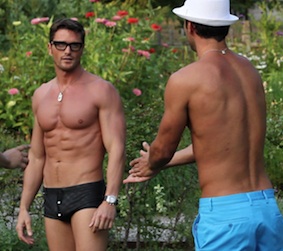
Reichen Lehmkuh (left) and his then-boyfriend Rodiney Santiago in a scene from the show’s first season. (Photo courtesy of Logo)
The couple broke up in November, shortly after the first season started airing. Rodiney admits the show was a factor. Might they still be together without “A-List”?
“I’d say it was half and half,” he says. “The show helped us to break up. We started to date and moved to New York together just six months into the relationship. It was very stressful for us. I can’t handle that.”
Reichen says he and Rodiney are now “friends in the best way possible” and says the second season has been much easier to shoot since he’s not in a relationship.
“It’s been more focused on my business ventures,” he says. “When it comes to the drama, I’ve been off the pedestal in the best way possible.”
New this season is 25-year-old Nyasha Zimucha, a straight entrepreneur and mega-achiever who runs her own business, hair-and-wig shop Embrace Your Hair. She was previously a judge on Little Miss Perfect. She’s a native of South Africa and came to the United States in 2001. She’s been in New York three years and knew “A-List”-er Mike Ruiz before joining the cast.
She says her presence adds an interesting punch to the new season.
“I think you’re going to be very entertained at how some of these relationships develop, both positive and negative,” she says. “It’s an interesting mix. Here you have this straight black girl with these six white, very handsome, very accomplished gay men. I think it’s historic because there’s really been nothing like it on television. You’re going to see not just the fights but the fun too, and I think that will be fun for the audience.”
The second season is still taping even as its first episodes are set to air. Three are fully edited and in the can. Pupa says he doesn’t know how long they’ll shoot — until he feels they have enough footage to bring the storylines to a sensible conclusion.
So how organic or contrived are the scenarios and does editing, obviously a necessity, sometimes distort the narrative?
“Like on any show, we like there to be a beginning, a middle and an end,” Pupa says. “You want to see the cast members start somewhere and end somewhere else. For each one it’s different. Last season we were still shooting until 10 days before the last episode, which is really unusual for this type of show … but it’s a lot more real than people think. They think it’s all very planned out but it’s really not. We ended last season with an argument between Austin and Reichen. That happened less than two weeks before it aired.”
None of the participants were contractually obligated to return for the second season. And the producers don’t tell them they have to meet with certain people or attend certain events. They take suggestions, though, and say they want to do their part to make the show as compelling as possible.
“It’s a nice relationship with cast and production,” Reichen says. “We all understand the result is trying to create something that people will want to watch.”
Camera crews follow cast members six days per week for about 10 hours each day when the show is shooting. Pupa says the cast does its best to schedule things more likely to be interesting when the show is shooting and save the boring stuff — like meeting with lawyers for their business ventures — off-camera. Reichen, for instance, says he traveled much of the six months between the two seasons, though he did see all the cast members at least once during that time, most often at charity events, which he says draw little media attention. He guesses he was only in New York for about 60 days of that six months. He’s been busy prepping a new book and getting ready to launch a fragrance line.
Often the best moments happen when the full cast is together.
“That’s when we have the greatest dynamic,” Pupa says. “Everybody loves Ryan. If he’s throwing a party, you know the whole cast will be there. If Austin throws a party, we don’t know who will walk through the door.”
And what about Austin — is he really the troublemaker he seemed to be from season one?
Reichen says there’s “some stuff” between them that goes down in season two. “You’ll just have to watch,” he says.
Rodiney has a tougher assessment.
“I don’t trust him and we cannot be friends,” he says. “He’s the kind of person I want him far away from my life. He’s evil and he does crazy stuff and I don’t want him part of my life.”
Pupa says Austin is reality’s answer to characters like Alexis and J.R.
“The golden rule of docu soap TV is that just because someone is hated doesn’t mean they’re not watchable,” he says. “It’s a Joan Collins thing for sure. Sometimes you don’t want to admit to liking Austin, but you love watching him.”
Nyasha says the title is a bit of a misnomer and says the show ultimately works because it’s real and people from all walks of life can relate.
“What it’s really about is interesting, dynamic people living in New York,” she says. “Some have great careers and some ain’t doing nothing, but it unfolds as great TV because it’s honest. Even a young straight woman can relate to this or that. Some might think, ‘I don’t relate, what the hell am I doing watching this crap?’ but any level of negative is part of the drama of any relationship and there’s not one person who doesn’t have some level of drama. If there is, give me their number. … It’s just heightened because it’s on TV.”
a&e features
Eastern Shore chef named James Beard Finalist
Harley Peet creates inventive food in an inclusive space

In a small Eastern Shore town filled with boutiques, galleries, and the occasional cry of waterfowl from the Chesapeake, Chef Harley Peet is most at home. In his Viennese-inflected, Maryland-sourced fine-dining destination Bas Rouge, Peet draws from his Northern Michigan upbringing, Culinary Institute of America education, and identity as a gay man, for inspiration.
And recently, Peet was named a James Beard Finalist for Best Chef: Mid-Atlantic – the first “Best Chef: Mid-Atlantic” finalist representing the Eastern Shore.
Peet, after graduation from the Culinary Institute of America, took a position as sous chef at Tilghman Island Inn, not far from Bas Rouge. Falling in love with the Eastern Shore, he continued his passion for racing sailboats, boating, gardening, and fishing, and living his somewhat pastoral life as he opened Bas Rouge in 2016 as head chef, a restaurant part of the Bluepoint Hospitality group, which runs more than a dozen concepts in and around Easton, Md.
Coming from a rural area and being gay, Peet knew he had his work cut out for him. He was always aware that the service and hospitality industry “can be down and dirty and rough.”
Now as a leader in the kitchen, he aims to “set a good example, and treat people how I want to be treated. I also want to make sure if you’re at our establishment, I’m the first to stand up and say something.”
The Bas Rouge cuisine, he says, is Contemporary European. “I’m inspired by old-world techniques of countries like Austria, Germany, and France, but I love putting a new spin on classic dishes and finding innovative ways to incorporate the bounty of local Chesapeake ingredients.”
His proudest dish: the humble-yet-elevated Wiener Schnitzel. “It is authentic to what one would expect to find in Vienna, down to the Lingonberries.” From his in-house bakery, Peet dries and grinds the housemade Kaiser-Semmel bread to use as the breadcrumbs.
Peet works to support the LGBTQ community inside and outside of the kitchen. “I love that our Bluepoint Hospitality team has created welcoming spaces where our patrons feel comfortable dining at each of our establishments. Our staff have a genuine respect for one another and work together free of judgment.”
Representing Bluepoint, Peet has participated in events like Chefs for Equality with the Human Rights Campaign, advocating for LGBTQ rights.
At Bas Rouge, Peet brings together his passion for inclusion steeped in a sustainability ethic. He sees environmental stewardship as a way of life. Peet and his husband have lived and worked on their own organic farm for several years. Through research in Europe, he learned about international marine sourcing. Witnessing the impacts of overfishing, Peet considers his own role in promoting eco-friendly practices at Bas Rouge. To that end, he ensures responsible sourcing commitments through his purveyors, relationships that have helped create significant change in how people dine in Easton.
“I have built great relationships in the community and there’s nothing better than one of our long-standing purveyors stopping in with a cooler of fresh fish from the Chesapeake Bay. This goes especially for catching and plating the invasive blue catfish species, which helps control the species’ threat to the local ecosystem.
Through his kitchen exploits, Peet expressed a unique connection to another gay icon in a rural fine-dining restaurant: Patrick O’Connell, of three Michelin starred Inn at Little Washington. In fact, Peet’s husband helped design some of O’Connell’s kitchen spaces. They’ve both been able to navigate treacherous restaurant-industry waters, and have come out triumphant and celebrated. Of O’Connell, Peet says that he “sees [his restaurants] as canvas, all artistry, he sees this as every night is a show.” But at the same time, his “judgment-free space makes him a role model.”
Being in Easton itself is not without challenges. Sourcing is a challenge, having to either fly or ship in ingredients, whereas urban restaurants have the benefit of trucking, he says. The small town “is romantic and charming,” but logistics are difficult – one of the reasons that Peet ensures his team is diverse, building in different viewpoints, and also “making things a hell of a lot more fun.”
Reflecting on challenges and finding (and creating) space on the Eastern Shore, Peet confirmed how important it was to surround himself with people who set a good example, and “if you don’t like the way something is going, fuck them and move on.”

Team DC, the umbrella organization for LGBTQ-friendly sports teams and leagues in the D.C. area, held its annual Night of Champions Awards Gala on Saturday, April 20 at the Hilton National Mall. The organization gave out scholarships to area LGBTQ student athletes as well as awards to the Different Drummers, Kelly Laczko of Duplex Diner, Stacy Smith of the Edmund Burke School, Bryan Frank of Triout, JC Adams of DCG Basketball and the DC Gay Flag Football League.
(Washington Blade photos by Michael Key)




















The 2024 National Cannabis Festival was held at the Fields at RFK Stadium on April 19-20.
(Washington Blade photos by Michael Key)
















Covering the @NatlCannaFest at RFK Stadium for @WashBlade . Stop by the LGBTQ+ booth and pick up a paper if you are here. pic.twitter.com/is7hnsaPns
— Michael Patrick Key (@MichaelKeyWB) April 20, 2024
-

 State Department2 days ago
State Department2 days agoState Department releases annual human rights report
-

 Maryland4 days ago
Maryland4 days agoJoe Vogel campaign holds ‘Big Gay Canvass Kickoff’
-

 Politics3 days ago
Politics3 days agoSmithsonian staff concerned about future of LGBTQ programming amid GOP scrutiny
-

 The White House24 hours ago
The White House24 hours agoWhite House debuts action plan targeting pollutants in drinking water

